人教版九年级英语第十单元Unit 10 You're supposed to shake hands Section B (2a-2e)(共55张PPT)
文档属性
| 名称 | 人教版九年级英语第十单元Unit 10 You're supposed to shake hands Section B (2a-2e)(共55张PPT) | 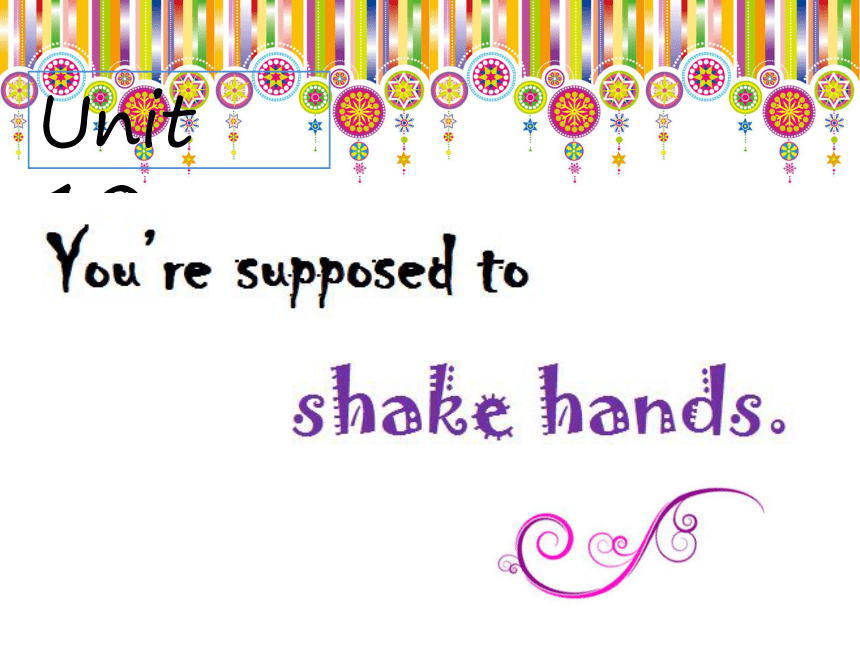 | |
| 格式 | zip | ||
| 文件大小 | 3.4MB | ||
| 资源类型 | 教案 | ||
| 版本资源 | 人教新目标(Go for it)版 | ||
| 科目 | 英语 | ||
| 更新时间 | 2022-10-12 14:11:18 | ||
图片预览

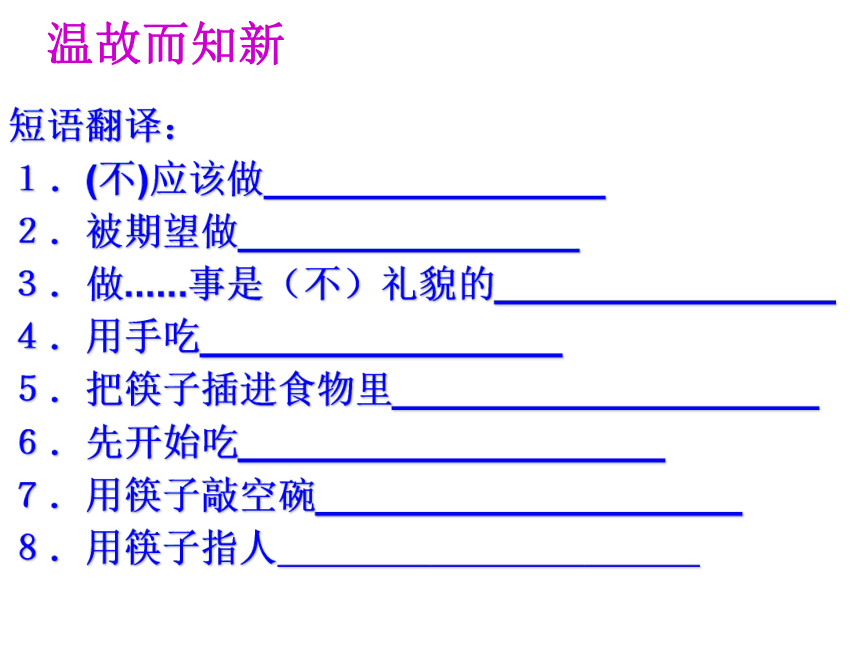
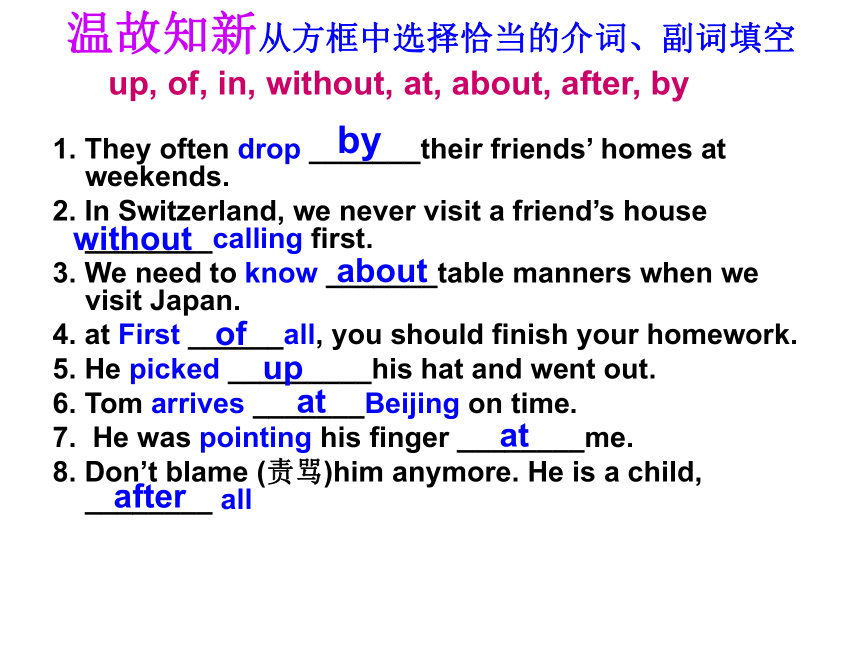

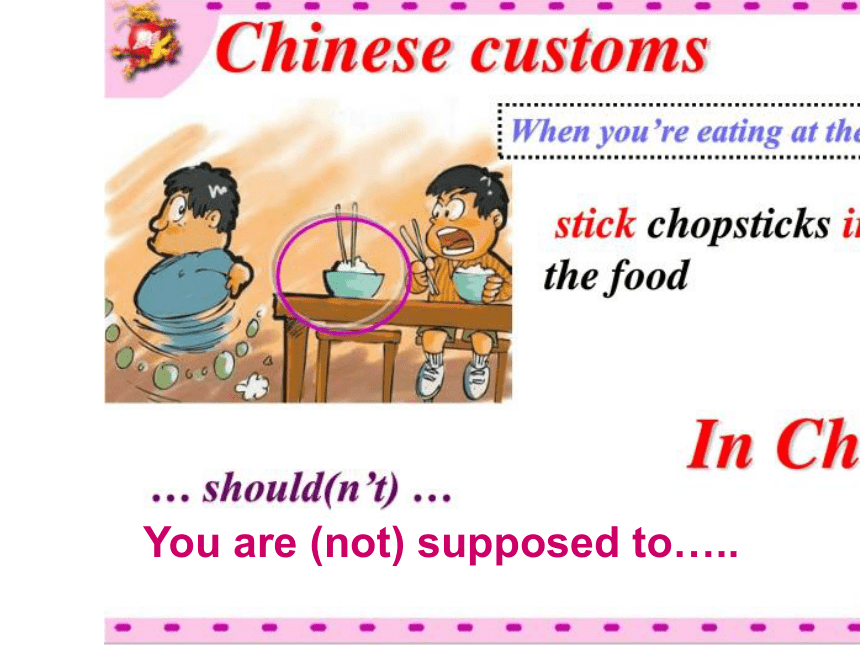
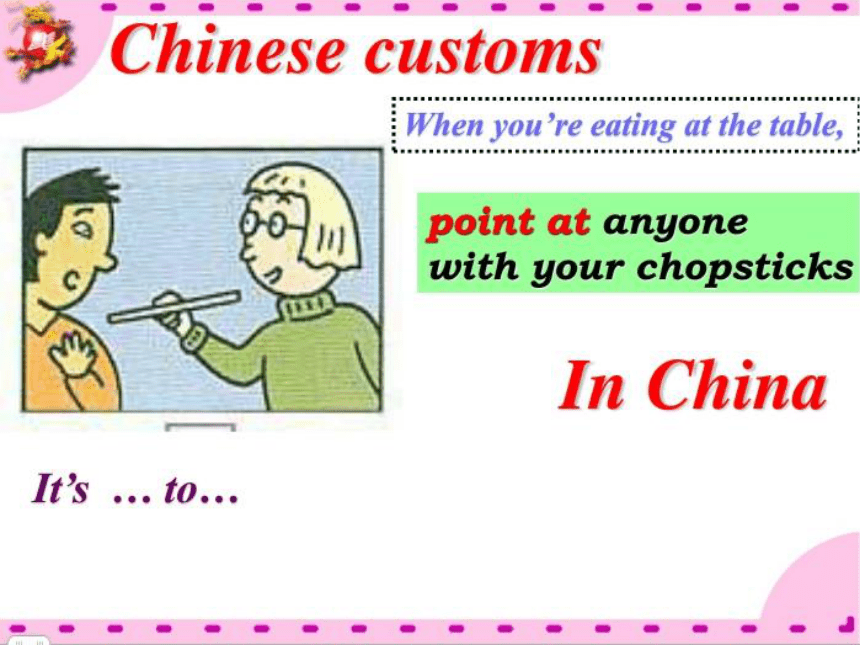
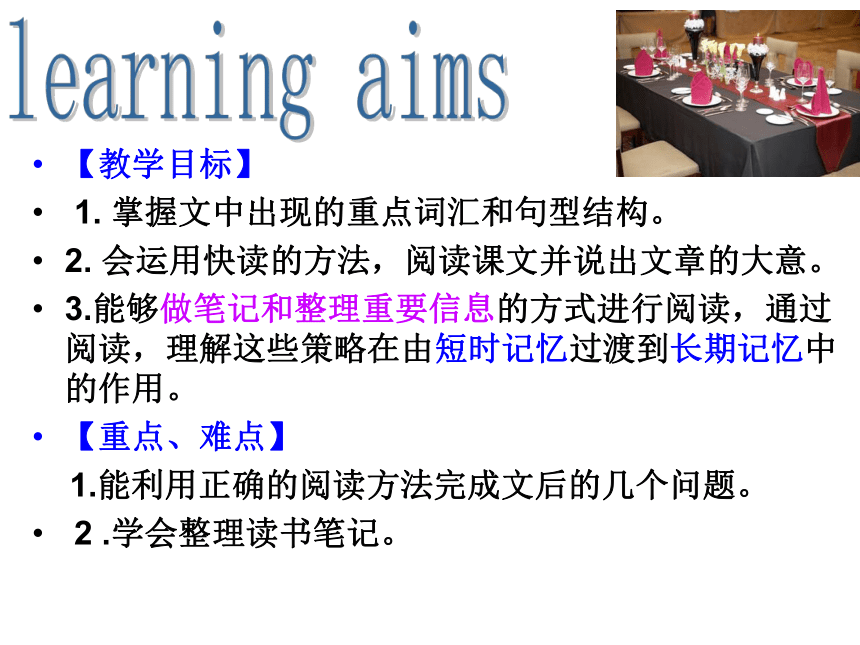
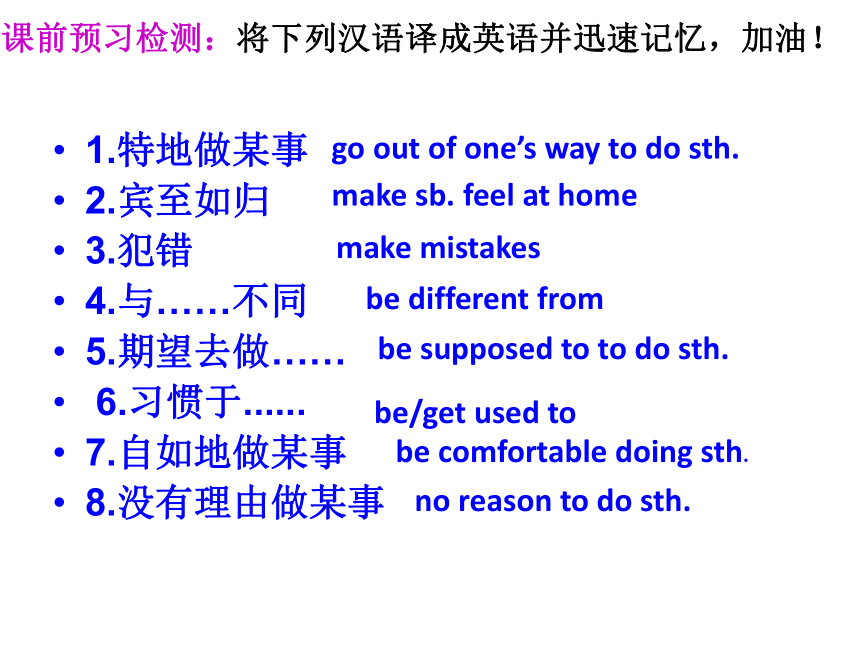
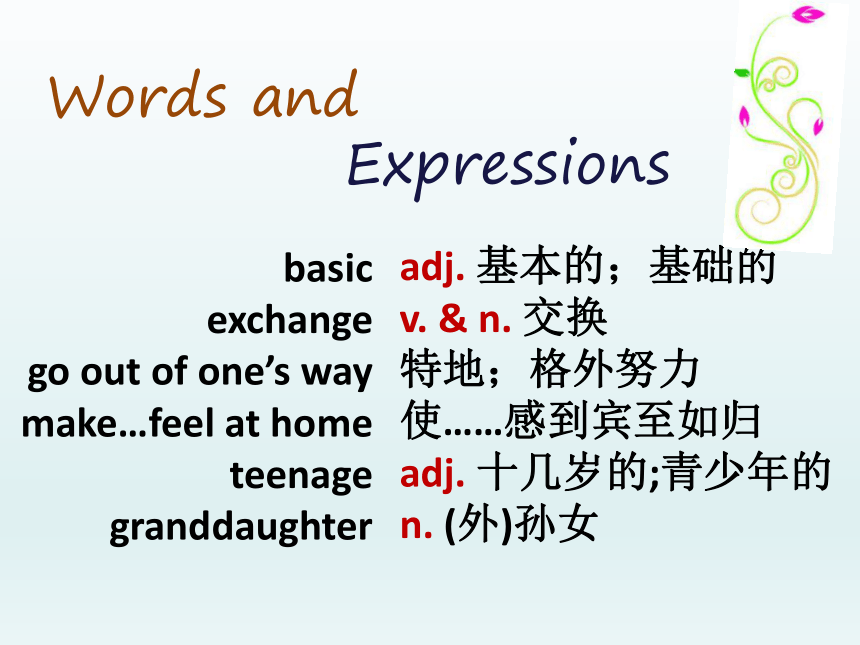
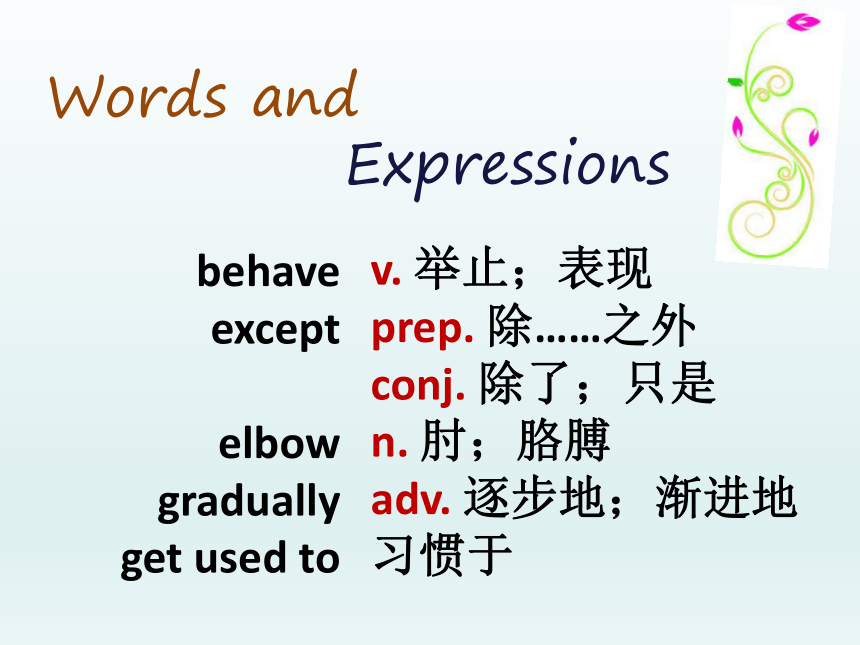


文档简介
(共55张PPT)
Unit 10
短语翻译:
1.(不)应该做________________
2.被期望做________________
3.做......事是(不)礼貌的________________
4.用手吃_________________
5.把筷子插进食物里____________________
6.先开始吃____________________
7.用筷子敲空碗____________________
8.用筷子指人___________
温故而知新
温故知新从方框中选择恰当的介词、副词填空
1. They often drop _______their friends’ homes at weekends.
2. In Switzerland, we never visit a friend’s house ________calling first.
3. We need to know _______table manners when we visit Japan.
4. at First ______all, you should finish your homework.
5. He picked _________his hat and went out.
6. Tom arrives _______Beijing on time.
7. He was pointing his finger ________me.
8. Don’t blame (责骂)him anymore. He is a child, ________ all
up, of, in, without, at, about, after, by
by
without
about
of
up
at
at
after
You are (not) supposed to…..
【教学目标】
1. 掌握文中出现的重点词汇和句型结构。
2. 会运用快读的方法,阅读课文并说出文章的大意。
3.能够做笔记和整理重要信息的方式进行阅读,通过阅读,理解这些策略在由短时记忆过渡到长期记忆中的作用。
【重点、难点】
1.能利用正确的阅读方法完成文后的几个问题。
2 .学会整理读书笔记。
课前预习检测:将下列汉语译成英语并迅速记忆,加油!
1.特地做某事
2.宾至如归
3.犯错
4.与……不同
5.期望去做……
6.习惯于......
7.自如地做某事
8.没有理由做某事
go out of one’s way to do sth.
make sb. feel at home
be/get used to
be comfortable doing sth.
no reason to do sth.
be different from
be supposed to to do sth.
make mistakes
basic
exchange
go out of one’s way
make…feel at home
teenage
granddaughter
adj. 基本的;基础的
v. & n. 交换
特地;格外努力
使……感到宾至如归
adj. 十几岁的;青少年的
n. (外)孙女
Words and
Expressions
behave
except
elbow
gradually
get used to
v. 举止;表现
prep. 除……之外
conj. 除了;只是
n. 肘;胳膊
adv. 逐步地;渐进地
习惯于
Words and
Expressions
Do you know where it is
What is this
The Eiffel Tower
What do you know about France
let 's enjoy the pictures!
Mona Lisa smile
The capital of art
The capital of fashion
Provence
The capital of romance
Provence is the home of perfumery.
普罗旺斯是香水业的发源地。
[pr vɑns]
[p 'fjum ri]
How much do you know about table manners of western countries
The capital of romance(浪漫)
What do you know about customs in France
They are relaxed about time.
They are supposed to kiss each other on the cheeks when they meet someone for the first time.
Do you know the table manners in France
Warming up
Look at these pictures about table manners in France.
Do you know which is allowed and which is not allowed
Put bread on the table.
Eat with your hands.
Put your elbows on the table.
What do you know about customs in foreign countries What do you think is the biggest challenge when visiting a foreign country
My cousin went to America, and she said that learning basic table manners was her biggest challenge. She never knew what she was supposed to do at the dinner table.
2a
An example
Read the passage ,match each paragraph with the main idea
A : Table manners in France
B: Lin Yue’s life in France
P78
2b Read the letter again and answer the questions.
1. Why is Lin Yue in France
She is an exchange student.
2. Does she enjoy staying with her host family How do you know
Yes, she does. Because they go out of their way to make her feel at home.
3. How does she feel about making mistakes when she speaks
French
It doesn't worry her like it used to.
4. What is the biggest challenge she is facing?
Learning how to behave at the dinner table.
Read the letter and answer the questions.
1. Why is Lin Yue in France
2. Does she enjoy staying with her host family How do you know
3. How does she feel about making mistakes when she speaks French
4. What is the biggest challenge she is facing
2b
1. She is on a student exchange program.
2. Yes, she does. This can be seen in the way she talks about her host family.
3. It doesn’t worry her as it used to.
4. Her biggest challenge is how to behave at the dinner table.
Task 1
①
②
③
④
Read the letter quickly and find out topic sentences of each paragraph .
Parapgraph 1
I’m having a great time on my student exchange program in France .
My host family is really nice .
Paragraph 2
My biggest challenge is learning how to behave at the dinner table .
Things are very different from the way they are at home .
Task 2
Read the letter and answer the question.
What is the topic sentence for each paragraph
topic sentence
topic sentence
解释说明中心句
What do Lin Yue’s host family do for her
Supporting details:
1.my hose family _________
2.the grandmother_________
3.The teenage granddaughter_______
Para 1
nice
Learn how to make Chinese food
Talk to me in Fench
Dear Laura,
Thanks for your message. Yes, I’m having a great
time on my exchange student program in France. I was a bit nervous before I arrived here, but there was no reason to be.
My host family is really nice. They go out of their way to make me feel at home. And you wouldn’t believe how
quickly my French has improved! I’m very comfortable speaking French now. Although I still make lots of mistakes,
it doesn’t worry me like it used to.
It’s not necessary to be nervous
I can speak French well now.
when I study in France as an exchange student
他们费尽心思让我感觉不到拘束。
trouble
Careful reading Para 2
合作交流:6人一组讨论错误处。由主讲人进行讲解。
French table manners (T or F)
You are supposed to put the bread on the plate.
You should eat everything with a fork.
It’s OK to eat fruit with your hands.
It’s polite to say “I’m full” when you don’t want to eat any more.
You shouldn’t put your elbows
on the table.
F
F
F
F
T
table
impolite
“ It was delicious”
except bread
Task 3
1. Making mistakes in French used to make Lin Yue nervous.
2. It was quite hard for her to feel good about speaking French.
3. The host family tried very hard to help Lin Yue.
4. Lin Yue has slowly learned how to be like her French friends.
2c Read the sentences and replace the underlined words with the phrases in the box.
went out of their way, be comfortable (doing) gradually gotten used to being, (something) worry (someone)
be comfortable
worry
went out of their way
gradually gotten used to being
Task 4
Dos Don’ts
You’re expected to put your bread on the table. You’re not supposed to put your bread on your plate.
2d Review the passage and make notes about French customs in the chart.
You are not supposed to eat anything with your hands except bread, not even fruit.
You are supposed to say, “That was delicious.” if you don't want any food.
You are not supposed to say you are full.
You are not supposed to put your elbows on the table.
You are supposed to cut up the food and eat it with a fork.
Task 5
My biggest challenge is learning how to behave at the dinner table. As you can imagine, things are
very different from the way they are at home. For example, you’re not supposed to put your bread on your plate. You are supposed to put it on the table!I thought that was pretty strange at first, but now I’m used to it. Another example is that
You’re not supposed to eat anything with your hands except bread, not even fruit! You have to cut it up and eat it with a fork.
Another thing is that it is impolite to say you’re full. If you don’t want any more food, you should just say, “It was delicious.”
things
Scan Para 2 and find out her biggest challenge
习惯
正如你所想象的
Also, you’re not supposed to put your elbows on the table. I have to say that I find it difficult to remember everything, but I’m gradually getting used to things, and
don’t find French customs so strange any more. I’ll
write again soon and tell you more about my life in France. Hope you’re having a good school year.
Yours,
Lin Yue
little by little
I find they are no longer strange.
记笔记:
1.Thank you for + n./ doing sth.
thanks to...幸亏,由于
(介词)
2.have a great time =have fun =enjoy oneself(good nice wonderful...)过得愉快
3.even, much,a lot ,a little a bit,far,still 修饰形容词 的比较级。(比较级的标志 than)
Language points
4.table manners 餐桌礼仪
manner 是 “礼貌”的意思, 常以复数形式出现。 如:
It’s bad manners to talk with a full mouth.
嘴里吃着东西说话是不礼貌的。
manner 还可以表示 “风俗;习惯”, 也常以复数形式出现。
例如:The manners of the ancient Egyptians
古埃及的风俗习惯
manner 还可以表示 “方法;方式” “态度;举止”等意思。
如: Why are you talking in such a strange manner
你为什么用这种奇怪的方式谈话?
5.I was a bit nervous before I arrived here, but there was no reason to be.
你没有理由这么紧张。
You have no reason to be nervous.
reason to do sth. 做某事的理由
no reason to do sth. 没有理由做……
7.They go out of their way to make me feel at home.
go out of one’s way to do sth. 竭尽全力做
make sb. feel at home 使某人感到宾至如归
他们想方设法为全体乘客服务。
They go out of their way to serve all the passengers.
这种温馨的气氛让顾客宾至如归。
The warm atmosphere made the customers feel at home.
make sb./sth.+adj.(做宾补)
make sb.do sth.使某人做某事
be made to do sth.
make mistakes make a decision
make one's bed make a noise
8.be comfortable doing sth.干某事流畅/流利(自如地做某事)
eg:I'm very comfortable speaking
French now.
behave v. 表现;举止 → behavior n. 行为;举止;习性;态度
He behaves himself like a man. 他表现得像一男子汉。
behave oneself 表现得体,有礼貌
9.Although I still make lots of mistakes, it doesn’t
worry me as it used to.
虽然我还是出很多错,但它不像以前那样让我烦恼了。
(1)although 为连词,引导让步状语从句,意思是“虽然……但是……”。
though与although同义,但although 较正式,多用于句首。它们不能和but 连用,但可以和yet, still, nevertheless 等副词连用。
(2) 副词still 意为“还;仍旧”,常位于系动词、助动词或情态动词之后,行为动词之前。
It was still raining. 雨还在下。
My finger still hurts. 我的手指还痛。
Although / Though he is very old, yet he is quite strong. 他虽然年纪大了,身体却还很健壮。
e.g.
e.g.
10.My biggest challenge is learning how to behave at the dinner table.我最大的挑战是学习餐桌上的礼仪。
他喜欢在晚饭后散步。
What he likes is taking a walk after supper.
learning 动名词在句中作表语
11.behave 动词, 意思是 “表现”
The boy behaved very well last night.
昨晚表现挺好。
The little boy behaved with great courage in the face of gunman.
在持枪歹徒面前,这个小男孩表现得极有勇气。
它还可以表示 “守规矩; 举止适当有礼”的意思。
如: Please behave yourself.
请礼貌点儿。
它的相应的名词是behavior, 意思是 “行为”。
12. be different from 与...不同
the same as...与...相同
11. You’re not supposed to eat anything with your hands except bread.
except 除……之外(后面的成分不包括在内)
besides 除……之外还(后面的成分包括在内)
We all went on a picnic except Tom.
We all went on a picnic besides Tom.
Tom未去
Tom也去了
12.I have to say, I find it difficult to remember everything …
她觉得在两天内完成工作是不可能的。
She feels it impossible to finish the work in two days.
find it + adj.+ to do sth.
(形式宾语) (不定式做真正宾语)
eg:We found it useful to read English in the morning
I find it difficult to remember everything, but I’m gradually getting used to things, and don’t find them so strange any more.
我发现将一切都记住很难,但慢慢就对这些东西习惯了,也就不再觉得它们很怪异了。
it在此作形式宾语,动词不定式短语to remember everything是真正的宾语,形容词difficult是宾补。it作形式宾语的基本句型为“主语 + 谓语 + it + 形容词 / 名词 + 动词不定式 / V-ing形式 / that从句”。
We think it necessary that we should review our lessons every evening.
我们认为每晚复习功课是很必要的。
I feel it my duty to help you.
我觉得帮助你是我的职责。
We thought it no use doing that.
我们认为做那件事毫无用处。
e.g.
13. …but I’m gradually getting used to it.
get used to sth./doing sth.
=be used to doing sth. 习惯于做某事
他不习惯住在乡下。
He isn’t used to living in the country.
used to do sth.过去常常做某事
be used for+名词或doing sth.
be used to do sth.被用来做某事
Translate the sentences.
full作形容词
满的;充满的
The room was full of people.
室内挤满了人。
吃饱的
I can’t eat any more. I’m full up.
我不能再吃了, 我已经饱了。
(衣服等)宽松的
She wore a full skirt.
她穿一件宽下摆的裙子。
full
be full of...充满...
be filled with...用...装满
(程度等)完全的;最大的;最高的;正式的
He is a full member of the committee.
他是委员会的正式成员。
The train was going at full speed.
火车在全速行驶。
full作副词
直接地;正好;恰好
The blow struck him full in the face.
这一拳正好击中他的面部。
非常地;充分地;完全地
The bananas are full ripe.
这些香蕉完全熟了。
活学活用
从上面给出的例句中我们可以看到full这个词的含义非常丰富。请根据以上例句,选择两到三个full的不同含义进行造句。
请在短文中找出以下短语
基本的餐桌礼仪
一次大的挑战
交流项目
特地;格外努力
使……感到宾至如归
用法语
舒适地做
非常想念
basic table manners
a big challenge
exchange program
go out of one’s way to
make … feel at home
in French
be comfortable doing
miss … a lot
请在短文中找出以下短语
与……不同
起初
习惯于
切碎
用叉子吃
记笔记
常时记忆
归纳大意
be different from
at first
get used to doing
cut sth. up
eat with a fork
take notes
long-term memory
summarize the main ideas
1. 没有理由感谢我。 (reason)
2. 老师不厌其烦地给我们讲解这道题。(go out one’s way)
3. 让我们为妈妈的健康干杯。(make a toast)
The teacher went out of her / his way
to explain this problem to us.
There is no reason to thank me.
Let’s make a toast to mother’s health.
根据所给的词汇提示,翻译下列句子。
4. 每当我不高兴时,姐姐总是逗我开心。
(every time)
5. 她非常好客(hospitable), 总能给我一种宾至如归的感觉。(make sb. feel at home)
She is very hospitable and always makes me feel at home.
Every time I am unhappy, my sister
always cheers me up.
1.在美国,人们应该握手。
In America, people _____________ shake hands.
2.我发现记住一切很难。
I find ____ ________ to remember everything.
3.我现在已习惯于晚饭后散步。
I am now used to ________ after dinner.
4.我喜欢吃水果,除了香蕉,它们太甜了。
I like to eat fruit, ______ bananas. They’re sweet.
根据汉语意思完成句子。
are supposed to
it
difficult
except
walking
本课时重点回顾
go out of one’s way
2. make…feel at home
3. get used to sth.
Homework
1. Review the new words and expressions.
2. Preview Unit 11.
Unit 10
短语翻译:
1.(不)应该做________________
2.被期望做________________
3.做......事是(不)礼貌的________________
4.用手吃_________________
5.把筷子插进食物里____________________
6.先开始吃____________________
7.用筷子敲空碗____________________
8.用筷子指人___________
温故而知新
温故知新从方框中选择恰当的介词、副词填空
1. They often drop _______their friends’ homes at weekends.
2. In Switzerland, we never visit a friend’s house ________calling first.
3. We need to know _______table manners when we visit Japan.
4. at First ______all, you should finish your homework.
5. He picked _________his hat and went out.
6. Tom arrives _______Beijing on time.
7. He was pointing his finger ________me.
8. Don’t blame (责骂)him anymore. He is a child, ________ all
up, of, in, without, at, about, after, by
by
without
about
of
up
at
at
after
You are (not) supposed to…..
【教学目标】
1. 掌握文中出现的重点词汇和句型结构。
2. 会运用快读的方法,阅读课文并说出文章的大意。
3.能够做笔记和整理重要信息的方式进行阅读,通过阅读,理解这些策略在由短时记忆过渡到长期记忆中的作用。
【重点、难点】
1.能利用正确的阅读方法完成文后的几个问题。
2 .学会整理读书笔记。
课前预习检测:将下列汉语译成英语并迅速记忆,加油!
1.特地做某事
2.宾至如归
3.犯错
4.与……不同
5.期望去做……
6.习惯于......
7.自如地做某事
8.没有理由做某事
go out of one’s way to do sth.
make sb. feel at home
be/get used to
be comfortable doing sth.
no reason to do sth.
be different from
be supposed to to do sth.
make mistakes
basic
exchange
go out of one’s way
make…feel at home
teenage
granddaughter
adj. 基本的;基础的
v. & n. 交换
特地;格外努力
使……感到宾至如归
adj. 十几岁的;青少年的
n. (外)孙女
Words and
Expressions
behave
except
elbow
gradually
get used to
v. 举止;表现
prep. 除……之外
conj. 除了;只是
n. 肘;胳膊
adv. 逐步地;渐进地
习惯于
Words and
Expressions
Do you know where it is
What is this
The Eiffel Tower
What do you know about France
let 's enjoy the pictures!
Mona Lisa smile
The capital of art
The capital of fashion
Provence
The capital of romance
Provence is the home of perfumery.
普罗旺斯是香水业的发源地。
[pr vɑns]
[p 'fjum ri]
How much do you know about table manners of western countries
The capital of romance(浪漫)
What do you know about customs in France
They are relaxed about time.
They are supposed to kiss each other on the cheeks when they meet someone for the first time.
Do you know the table manners in France
Warming up
Look at these pictures about table manners in France.
Do you know which is allowed and which is not allowed
Put bread on the table.
Eat with your hands.
Put your elbows on the table.
What do you know about customs in foreign countries What do you think is the biggest challenge when visiting a foreign country
My cousin went to America, and she said that learning basic table manners was her biggest challenge. She never knew what she was supposed to do at the dinner table.
2a
An example
Read the passage ,match each paragraph with the main idea
A : Table manners in France
B: Lin Yue’s life in France
P78
2b Read the letter again and answer the questions.
1. Why is Lin Yue in France
She is an exchange student.
2. Does she enjoy staying with her host family How do you know
Yes, she does. Because they go out of their way to make her feel at home.
3. How does she feel about making mistakes when she speaks
French
It doesn't worry her like it used to.
4. What is the biggest challenge she is facing?
Learning how to behave at the dinner table.
Read the letter and answer the questions.
1. Why is Lin Yue in France
2. Does she enjoy staying with her host family How do you know
3. How does she feel about making mistakes when she speaks French
4. What is the biggest challenge she is facing
2b
1. She is on a student exchange program.
2. Yes, she does. This can be seen in the way she talks about her host family.
3. It doesn’t worry her as it used to.
4. Her biggest challenge is how to behave at the dinner table.
Task 1
①
②
③
④
Read the letter quickly and find out topic sentences of each paragraph .
Parapgraph 1
I’m having a great time on my student exchange program in France .
My host family is really nice .
Paragraph 2
My biggest challenge is learning how to behave at the dinner table .
Things are very different from the way they are at home .
Task 2
Read the letter and answer the question.
What is the topic sentence for each paragraph
topic sentence
topic sentence
解释说明中心句
What do Lin Yue’s host family do for her
Supporting details:
1.my hose family _________
2.the grandmother_________
3.The teenage granddaughter_______
Para 1
nice
Learn how to make Chinese food
Talk to me in Fench
Dear Laura,
Thanks for your message. Yes, I’m having a great
time on my exchange student program in France. I was a bit nervous before I arrived here, but there was no reason to be.
My host family is really nice. They go out of their way to make me feel at home. And you wouldn’t believe how
quickly my French has improved! I’m very comfortable speaking French now. Although I still make lots of mistakes,
it doesn’t worry me like it used to.
It’s not necessary to be nervous
I can speak French well now.
when I study in France as an exchange student
他们费尽心思让我感觉不到拘束。
trouble
Careful reading Para 2
合作交流:6人一组讨论错误处。由主讲人进行讲解。
French table manners (T or F)
You are supposed to put the bread on the plate.
You should eat everything with a fork.
It’s OK to eat fruit with your hands.
It’s polite to say “I’m full” when you don’t want to eat any more.
You shouldn’t put your elbows
on the table.
F
F
F
F
T
table
impolite
“ It was delicious”
except bread
Task 3
1. Making mistakes in French used to make Lin Yue nervous.
2. It was quite hard for her to feel good about speaking French.
3. The host family tried very hard to help Lin Yue.
4. Lin Yue has slowly learned how to be like her French friends.
2c Read the sentences and replace the underlined words with the phrases in the box.
went out of their way, be comfortable (doing) gradually gotten used to being, (something) worry (someone)
be comfortable
worry
went out of their way
gradually gotten used to being
Task 4
Dos Don’ts
You’re expected to put your bread on the table. You’re not supposed to put your bread on your plate.
2d Review the passage and make notes about French customs in the chart.
You are not supposed to eat anything with your hands except bread, not even fruit.
You are supposed to say, “That was delicious.” if you don't want any food.
You are not supposed to say you are full.
You are not supposed to put your elbows on the table.
You are supposed to cut up the food and eat it with a fork.
Task 5
My biggest challenge is learning how to behave at the dinner table. As you can imagine, things are
very different from the way they are at home. For example, you’re not supposed to put your bread on your plate. You are supposed to put it on the table!I thought that was pretty strange at first, but now I’m used to it. Another example is that
You’re not supposed to eat anything with your hands except bread, not even fruit! You have to cut it up and eat it with a fork.
Another thing is that it is impolite to say you’re full. If you don’t want any more food, you should just say, “It was delicious.”
things
Scan Para 2 and find out her biggest challenge
习惯
正如你所想象的
Also, you’re not supposed to put your elbows on the table. I have to say that I find it difficult to remember everything, but I’m gradually getting used to things, and
don’t find French customs so strange any more. I’ll
write again soon and tell you more about my life in France. Hope you’re having a good school year.
Yours,
Lin Yue
little by little
I find they are no longer strange.
记笔记:
1.Thank you for + n./ doing sth.
thanks to...幸亏,由于
(介词)
2.have a great time =have fun =enjoy oneself(good nice wonderful...)过得愉快
3.even, much,a lot ,a little a bit,far,still 修饰形容词 的比较级。(比较级的标志 than)
Language points
4.table manners 餐桌礼仪
manner 是 “礼貌”的意思, 常以复数形式出现。 如:
It’s bad manners to talk with a full mouth.
嘴里吃着东西说话是不礼貌的。
manner 还可以表示 “风俗;习惯”, 也常以复数形式出现。
例如:The manners of the ancient Egyptians
古埃及的风俗习惯
manner 还可以表示 “方法;方式” “态度;举止”等意思。
如: Why are you talking in such a strange manner
你为什么用这种奇怪的方式谈话?
5.I was a bit nervous before I arrived here, but there was no reason to be.
你没有理由这么紧张。
You have no reason to be nervous.
reason to do sth. 做某事的理由
no reason to do sth. 没有理由做……
7.They go out of their way to make me feel at home.
go out of one’s way to do sth. 竭尽全力做
make sb. feel at home 使某人感到宾至如归
他们想方设法为全体乘客服务。
They go out of their way to serve all the passengers.
这种温馨的气氛让顾客宾至如归。
The warm atmosphere made the customers feel at home.
make sb./sth.+adj.(做宾补)
make sb.do sth.使某人做某事
be made to do sth.
make mistakes make a decision
make one's bed make a noise
8.be comfortable doing sth.干某事流畅/流利(自如地做某事)
eg:I'm very comfortable speaking
French now.
behave v. 表现;举止 → behavior n. 行为;举止;习性;态度
He behaves himself like a man. 他表现得像一男子汉。
behave oneself 表现得体,有礼貌
9.Although I still make lots of mistakes, it doesn’t
worry me as it used to.
虽然我还是出很多错,但它不像以前那样让我烦恼了。
(1)although 为连词,引导让步状语从句,意思是“虽然……但是……”。
though与although同义,但although 较正式,多用于句首。它们不能和but 连用,但可以和yet, still, nevertheless 等副词连用。
(2) 副词still 意为“还;仍旧”,常位于系动词、助动词或情态动词之后,行为动词之前。
It was still raining. 雨还在下。
My finger still hurts. 我的手指还痛。
Although / Though he is very old, yet he is quite strong. 他虽然年纪大了,身体却还很健壮。
e.g.
e.g.
10.My biggest challenge is learning how to behave at the dinner table.我最大的挑战是学习餐桌上的礼仪。
他喜欢在晚饭后散步。
What he likes is taking a walk after supper.
learning 动名词在句中作表语
11.behave 动词, 意思是 “表现”
The boy behaved very well last night.
昨晚表现挺好。
The little boy behaved with great courage in the face of gunman.
在持枪歹徒面前,这个小男孩表现得极有勇气。
它还可以表示 “守规矩; 举止适当有礼”的意思。
如: Please behave yourself.
请礼貌点儿。
它的相应的名词是behavior, 意思是 “行为”。
12. be different from 与...不同
the same as...与...相同
11. You’re not supposed to eat anything with your hands except bread.
except 除……之外(后面的成分不包括在内)
besides 除……之外还(后面的成分包括在内)
We all went on a picnic except Tom.
We all went on a picnic besides Tom.
Tom未去
Tom也去了
12.I have to say, I find it difficult to remember everything …
她觉得在两天内完成工作是不可能的。
She feels it impossible to finish the work in two days.
find it + adj.+ to do sth.
(形式宾语) (不定式做真正宾语)
eg:We found it useful to read English in the morning
I find it difficult to remember everything, but I’m gradually getting used to things, and don’t find them so strange any more.
我发现将一切都记住很难,但慢慢就对这些东西习惯了,也就不再觉得它们很怪异了。
it在此作形式宾语,动词不定式短语to remember everything是真正的宾语,形容词difficult是宾补。it作形式宾语的基本句型为“主语 + 谓语 + it + 形容词 / 名词 + 动词不定式 / V-ing形式 / that从句”。
We think it necessary that we should review our lessons every evening.
我们认为每晚复习功课是很必要的。
I feel it my duty to help you.
我觉得帮助你是我的职责。
We thought it no use doing that.
我们认为做那件事毫无用处。
e.g.
13. …but I’m gradually getting used to it.
get used to sth./doing sth.
=be used to doing sth. 习惯于做某事
他不习惯住在乡下。
He isn’t used to living in the country.
used to do sth.过去常常做某事
be used for+名词或doing sth.
be used to do sth.被用来做某事
Translate the sentences.
full作形容词
满的;充满的
The room was full of people.
室内挤满了人。
吃饱的
I can’t eat any more. I’m full up.
我不能再吃了, 我已经饱了。
(衣服等)宽松的
She wore a full skirt.
她穿一件宽下摆的裙子。
full
be full of...充满...
be filled with...用...装满
(程度等)完全的;最大的;最高的;正式的
He is a full member of the committee.
他是委员会的正式成员。
The train was going at full speed.
火车在全速行驶。
full作副词
直接地;正好;恰好
The blow struck him full in the face.
这一拳正好击中他的面部。
非常地;充分地;完全地
The bananas are full ripe.
这些香蕉完全熟了。
活学活用
从上面给出的例句中我们可以看到full这个词的含义非常丰富。请根据以上例句,选择两到三个full的不同含义进行造句。
请在短文中找出以下短语
基本的餐桌礼仪
一次大的挑战
交流项目
特地;格外努力
使……感到宾至如归
用法语
舒适地做
非常想念
basic table manners
a big challenge
exchange program
go out of one’s way to
make … feel at home
in French
be comfortable doing
miss … a lot
请在短文中找出以下短语
与……不同
起初
习惯于
切碎
用叉子吃
记笔记
常时记忆
归纳大意
be different from
at first
get used to doing
cut sth. up
eat with a fork
take notes
long-term memory
summarize the main ideas
1. 没有理由感谢我。 (reason)
2. 老师不厌其烦地给我们讲解这道题。(go out one’s way)
3. 让我们为妈妈的健康干杯。(make a toast)
The teacher went out of her / his way
to explain this problem to us.
There is no reason to thank me.
Let’s make a toast to mother’s health.
根据所给的词汇提示,翻译下列句子。
4. 每当我不高兴时,姐姐总是逗我开心。
(every time)
5. 她非常好客(hospitable), 总能给我一种宾至如归的感觉。(make sb. feel at home)
She is very hospitable and always makes me feel at home.
Every time I am unhappy, my sister
always cheers me up.
1.在美国,人们应该握手。
In America, people _____________ shake hands.
2.我发现记住一切很难。
I find ____ ________ to remember everything.
3.我现在已习惯于晚饭后散步。
I am now used to ________ after dinner.
4.我喜欢吃水果,除了香蕉,它们太甜了。
I like to eat fruit, ______ bananas. They’re sweet.
根据汉语意思完成句子。
are supposed to
it
difficult
except
walking
本课时重点回顾
go out of one’s way
2. make…feel at home
3. get used to sth.
Homework
1. Review the new words and expressions.
2. Preview Unit 11.
同课章节目录
- Unit 1 How can we become good learners.
- Section A
- Section B
- Unit 2 I think that mooncakes are delicious!
- Section A
- Section B
- Unit 3 Could you please tell me where the restroom
- Section A
- Section B
- Unit 4 I used to be afraid of the dark.
- Section A
- Section B
- Unit 5 What are the shirts made of?
- Section A
- Section B
- Review of Units 1-5
- Unit 6 When was it invented?
- Section A
- Section B
- Unit 7 Teenagers should be allowed to choose their
- Section A
- Section B
- Unit 8 It must belong to Carla.
- Section A
- Section B
- Unit 9 I like music that I can dance to.
- Section A
- Section B
- Unit 10 You're supposed to shake hands.
- Section A
- Section B
- Review of Units 6-10
- Unit 11 Sad movies make me cry.
- Section A
- Section B
- Unit 12 Life is full of the unexpected
- Section A
- Section B
- Unit 13 We're trying to save the earth!
- Section A
- Section B
- Unit 14 I remember meeting all of you in Grade 7.
- Section A
- Section B
- Review of Units 11-14
